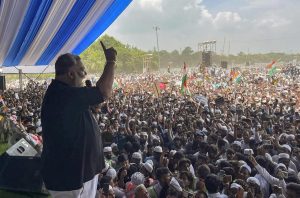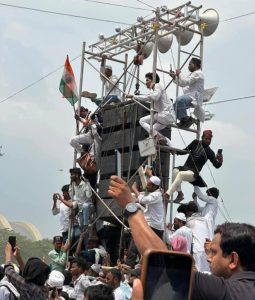Patna: A large-scale protest was held on Sunday at Gandhi Maidan in Patna against the recently enacted Waqf Act 2025, which has drawn criticism from several political parties, religious organisations, and civil society groups. The demonstration, titled ‘Waqf Bachao, Dastoor Bachao (Save Waqf, Save Constitution)’, was organised by Imarat-e-Shariah (Bihar, Odisha, Jharkhand & West Bengal) under the leadership of Amir-e-Shariat Maulana Ahmad Wali Faisal Rahmani.
According to the organisers, the protest witnessed the participation of over one million people from states including Bihar, Jharkhand, Odisha, Uttar Pradesh, Madhya Pradesh, Delhi, Kerala, and others. While official estimates were not immediately available, visuals showed a significant turnout at the historic ground, which has been a site of major political and social gatherings in the past.
Despite high temperatures and limited facilities, a diverse group of attendees—including religious scholars, students, women, activists, and members of the public—took part in the day-long event. The organisers said the protest aimed to raise concerns about the Waqf Act’s impact on community property rights and religious endowments.
Participation from Religious and Political Leadership
A wide range of religious figures addressed the gathering. Notable among them were Sarwar Chishti, Sajjada Nashin of Ajmer Sharif, Yasin Ali Usmani Badayuni, Secretary of the All India Muslim Personal Law Board, and a representative of Maulana Arshad Madani, President of Jamiat Ulama-i-Hind. Several other clerics and religious scholars from different parts of the country were also present.

On the political front, Tejashwi Yadav, Leader of the Opposition in the Bihar Assembly, CPIML General Secretary Dipankar Bhattacharya, Congress senior leader Salman Khurshid, Rajya Sabha MP Imran Pratapgarhi, Purnia MP Pappu Yadav were also present and addressed the gathering.
“This is not just a legal amendment; it’s a systematic attack on the constitutional rights of Muslims and the autonomy of Waqf institutions. When Mahagathbandhan will come to power, it will throw the act in dustbin,” Tejaswi Yadav said.
Dipankar Bhattacharya voiced his party’s objections to the Act. “The Waqf Act 2025 is a Trojan horse. It comes in the name of reform, but its real goal is dispossession,” he alleged.
Congress state leadership delivered messages of support from Rahul Gandhi and Mallikarjun Kharge, raising constitutional concerns regarding the Act. Pappu Yadav questioned the focus on Waqf properties over other large landowners.
Wali Rahmani, an educationist and founder of Umeed Global School, addressed the youth in the audience, stating:
“This is not just a protest—it is a people’s movement. Our institutions, our dignity, our rights—everything is at stake.”

Concerns Over the Waqf Act 2025
The Waqf Act 2025, passed earlier this year, introduces changes that critics say increase state control over Waqf properties. Legal experts and civil society representatives argue that it could affect the autonomy of religious endowments, with implications for institutions such as schools, graveyards, and mosques that rely on such land holdings. Protesters cited concerns regarding Articles 13, 14, 25, 26, and 300A of the Constitution, and pointed to past Supreme Court judgments on Waqf autonomy.
The central government has stated that the amendments aim to improve transparency, reduce mismanagement, and streamline the administration of Waqf assets. However, critics argue that the Act allows for overreach and reduces community participation in decision-making processes.
At the conclusion of the event, Maulana Faisal Rahmani stated that the demonstration marked a major milestone in what he described as an ongoing campaign. A Bihar-Jharkhand Coordination Committee was announced to continue public engagement and explore legal avenues.
Possible Political Implications
The protest is expected to have a bearing on the political landscape in Bihar, where assembly elections are due in the coming year. With Muslims forming more than 16% of the state’s electorate, the issue could influence voting patterns, particularly in constituencies where Waqf properties play a visible community role. The joint participation of leaders from RJD, Congress, CPIML, and other parties indicates that opposition to the Act may become a shared platform in the months ahead.
Observers note that the extent to which this issue will resonate with the broader electorate remains to be seen and will depend on how it is addressed by both the ruling and opposition parties in their campaigns and public messaging.


